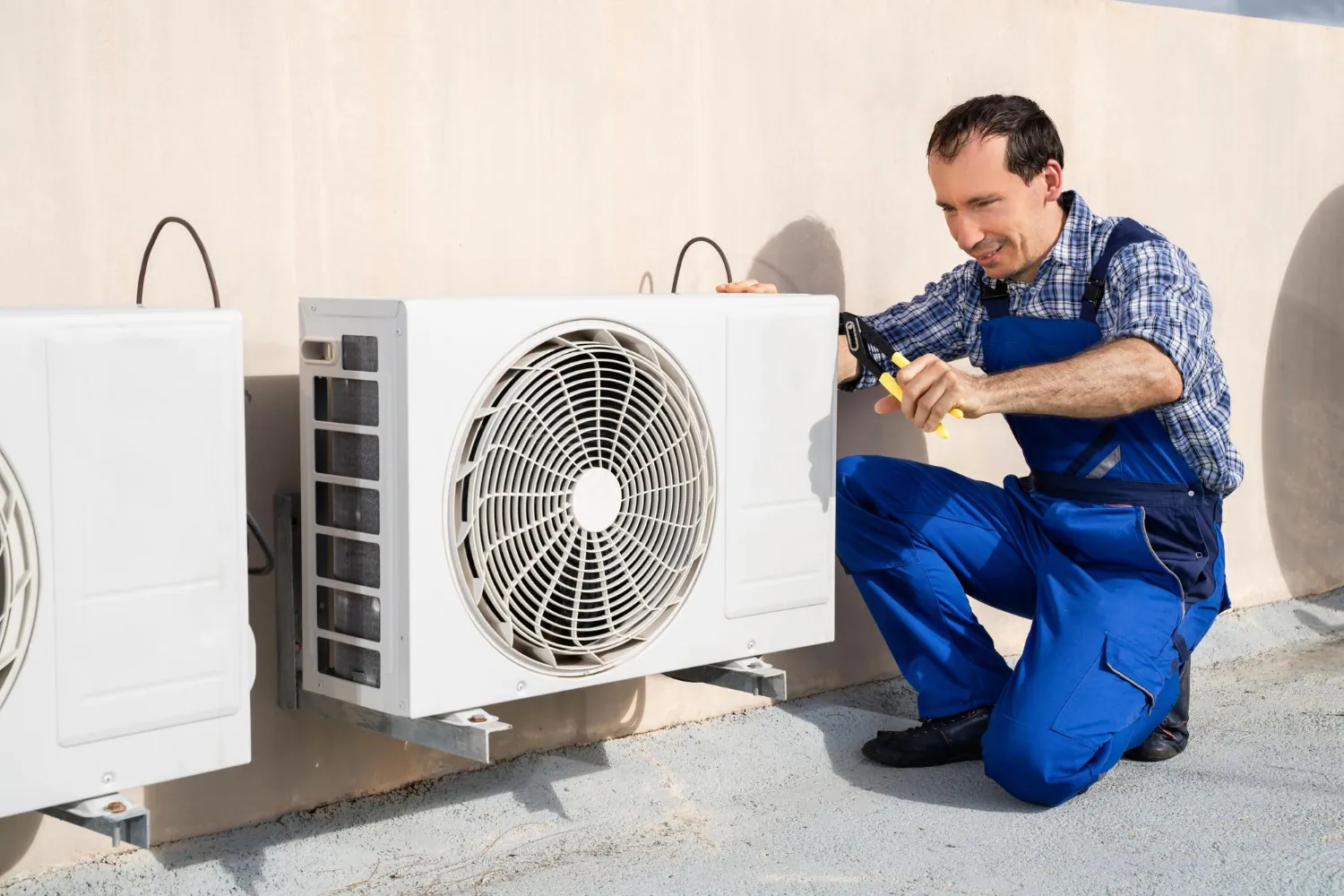Are you struggling to keep your home cool during a hot summer? You need to maintain your heating and air conditioning system in a comfortable living environment. Confused about repair or replace air conditioner? Read this article to get more information about AC repair vs replace air conditioner and make a better decision whether to repair your existing AC unit or purchase a new AC
As the heat approaches, knowing when to repair or replace your air conditioner becomes essential for ensuring a cool and pleasant home all season long. Whether you’re dealing with unexpected breakdowns or rising energy bills, making an informed decision can significantly impact your comfort and budget.
| Factor | Repair Details | Replace Details |
| Cost | Average repair costs range from $150 to $600, depending on the issue. | Depending on the type and brand, the average replacement costs range from $3,000 to $7,500 for residential units. |
| Age of the Unit | Recommended if the unit is less than 10 years old and has not had frequent issues. | Recommended if the unit is over 15 years old, as it may be nearing the end of its lifespan. |
| Energy Efficiency | Older units may be less efficient, resulting in higher energy bills (12-14 SEER rating). | Newer models are typically 14-25 SEER rated, leading to lower energy consumption and cost savings (up to 50% reduction in bills). |
| Warranty Coverage | Many repairs may be covered under warranty, potentially reducing out-of-pocket costs. | New units often come with a manufacturer warranty of 5-10 years, covering parts and labor for certain repairs. |
| Frequency of Repairs | If repairs are needed more than once a year, it may be cost-effective to consider replacement. | A new air conditioner may typically not require major repairs for the first few years if properly maintained. |
| Comfort and Performance | Repairs can temporarily restore comfort, but older units may struggle to maintain consistent temperatures. | New units provide improved comfort, better air circulation, and consistent temperature control throughout the home. |
| Environmental Impact | Repairing extends the life of existing equipment, reducing waste. | Replacing your unit with energy-efficient models can lower your carbon footprint over time. |
| Cooling Capacity | Repairs may not increase the cooling capacity of older units, which might be undersized for current home needs. | New installations allow for proper sizing to meet current home cooling demands, improving overall comfort. |
| Installation Time | Repairs for your HVAC system can generally be fixed in just a few hours. | Replacing an AC unit may take a day or more, especially if ductwork needs to be updated or replaced. |
| Financing Options | Typically requires immediate payment for repairs. | Many HVAC companies provide financing options for air conditioning replacements, enabling homeowners to distribute the costs of repairs or replacement over an extended period. |
Table of Contents
When Should You Repair AC?

Repairing your air conditioning unit can be a viable option under certain circumstances. Here are some situations to consider repairing your AC:
- Minor Breakdowns: If the issue is minor, such as a clogged filter, refrigerant leak, or faulty thermostat, repairs can restore functionality without significant expense.
- Recent Installation: If your air conditioning system is relatively new (under 10 years), it may make sense to repair it, especially if it has been well-maintained.
- Cost-Effective Solutions: When repair costs are significantly lower than replacement, it may be wise to opt for repairs. Compare the estimated repair cost to the potential cost of a new unit, factoring in labor and parts.
- Warranty Coverage: If your unit is still under warranty, repairs may be covered, making it a cost-effective option.
- Occasional Use: If you only use your AC occasionally or during peak seasons, repairing might be the better option, especially if the unit is still functioning adequately.
When Should You Replace AC?

On the other hand, there are situations when replacing your air conditioning unit is the better choice. Consider the following factors:
- Age of the Unit: An air conditioner that exceeds 15 years in age is probably approaching the end of its useful life. Investing in a new unit can provide better efficiency and reliability.
- Frequent Repairs: If your air conditioner requires frequent repairs—especially in one season—it’s often more economical to invest in a new unit than to continue repairing an aging system.
- Rising Energy Costs: If you notice a significant increase in your energy bills, it may be time to consider a replacement. Newer models are designed to be more energy-efficient, potentially saving you money over time.
- Inconsistent Cooling: If your AC struggles to cool your home evenly or fails to maintain a comfortable temperature, replacement might be necessary to ensure consistent comfort.
- Refrigerant Type: If your AC uses R-22 refrigerant, which is being phased out, replacing the unit with a more modern, eco-friendly model could be a wise decision.
- Home Renovations: If you’re renovating your home or adding square footage, a new, properly-sized unit may be needed to efficiently cool the additional space.
Final Takeaways
Deciding between repair vs replace air conditioner is a crucial decision for homeowners. Evaluate factors such as the age of your air conditioner, the regularity and expense of repairs, its energy efficiency, and your comfort needs.
While repairing can be a cost-effective solution in some cases, replacing your AC can offer long-term benefits, including improved efficiency and comfort.
Before making a decision, consult with a professional ac repair technician who can assess your cooling system and provide personalized recommendations based on your specific situation. Ultimately, whether you choose to repair or replace your air conditioner, the goal is to ensure a comfortable and efficient home environment.
We offer best services for AC repair in Houston and air conditioning repair in Richmond. Contact us to a free quote.
FAQs
1. What is the average lifespan of an AC?
The average lifespan of an air conditioning unit is typically between 10 to 15 years. However, factors such as maintenance, usage, and type of unit can influence longevity.
2. Is it better to repair or replace an AC unit?
Whether to repair or replace your AC unit depends on its age, the cost of repairs, and your long-term comfort needs. Generally, if the unit is old and frequently breaking down, replacement is often more cost-effective.
3. When should you replace or repair your air con?
Consider replacing your air conditioner if it is over 15 years old, requires frequent repairs, or is inefficient. On the other hand, if the issue is minor and the unit is relatively new, repairing may be the best option.
4. Is it worth fixing a 20-year-old AC unit System?
Fixing a 20-year-old AC unit may not be worth it, as newer models offer better energy efficiency and reliability. It’s usually more cost-effective to invest in a new system.
5. How many years should an AC system be replaced?
Most air conditioning units should be replaced every 10 to 15 years. Regular maintenance and energy efficiency should also guide your decision for replacement.




